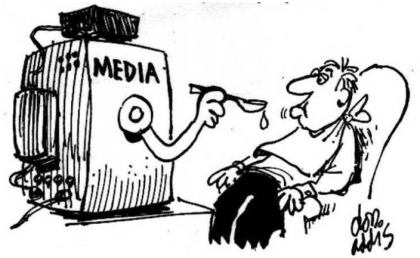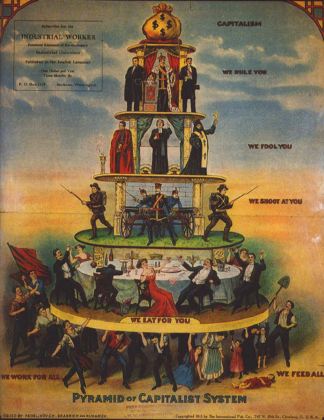
Description
Class Time: Wed @ 2:45-5:30 pm Class Room: H-521
Professor’s Office: H-1125.12
Office Hours: By Request
Course Description
Politics and media studies are interrelated and multifaceted topics. Newspapers, radio, TV, and the internet are some of many media forms that carry messages about political ideas, social relations and prevailing power structures. Signs and symbols can be creative and/or coercive. They can be used to educate people about world issues so that people can participate in political platforms as informed citizens; however they can also be used to misinform the public in order to manage public opinion and push a specific political agenda. A variety of political actors, such as political parties, pressure groups, people with wealth and influence, and concerned citizens everywhere use media to their advantage – some with more, others with less success.
In this course, we will examine the interaction between politics and media by looking at how technological changes in communication has shaped political life. We will use a multidimensional framework taking into consideration the way media is encoded and decoded, media organizations and technologies as well as the political and socio-economic environment from which media messages are produced.
In this course, we will address the following questions: What is the key to effective media management? Who controls what gets onto the media and what gets excluded? What makes something newsworthy? Why are some issues covered and many others ignored? How does the media shape our political culture, our minds and our identities as a people? What can we do to ensure, that this instrument that plays such a powerful role in the formation of our political consciousness, remains fair, and factual? How can we ensure that the media does not fall into the hands of those who are driven by selfish or vested interests?
By the end of this course, students will:
- Understand the complex inter-relationship between the media and politics and the impact of technological changes on democratic governance
- Be sensitive to the language of political deception, the use of illusion as an instrument to manufacture consent
- Understand the use of marketing, advertising, public relations, public opinion research as tools of political persuasion
- Be familiar with the ideas of the most significant theorists in this field
- Know how the news agenda is set and how media managers filter the news
- Understand the emerging role of the internet in the political electoral process
- Have explored ways to enhance the social responsibility of the media
Course Materials and Text
Students are expected to complete ALL the designated readings and watch ALL of the assigned videos BEFORE EACH CLASS. Students are also expected to attend ALL classes, and participate in class discussions.
The required textbook for this course is: Paul Nesbitt-Larking. Politics, Society and the Media (2nd Edition). Broadview Press. 2009.
The professor’s power-point lecture notes will be posted on the course site on a weekly basis before each class.
Students are required to watch the following documentary movies:
- The Century of the Self (2002) – Adam Curtis
- The Persuaders (2003) – Barak Goodman and Rachel Dretzin
- Manufacturing Consent (1992) – Mark Achbar and Peter Wintonick
- Control Room (2004) – Jehane Noujaim
- Operation Hollywood (2004) – Emilio Pacull
- This Film is Not Yet Rated (2006) – Kirby Dick
- We are Legion: The Story of Hacktivists (2012) – Brian Knappenberger
Recommended readings: URLs and other electronic sources may be posted on the course website from time to time. Please visit the course website to get this material. These are only for interest and are not required.
A short bibliography at the end of this outline will also contain additional readings that may be consulted by students in preparation of their assignments and to deepen their knowledge and understanding of the field.
Course Format
This course will consist of a variety of pedagogical styles including lectures, discussions, guest speakers, and community service learning. Students are expected to read the required text and/or watch the assigned movie before coming to class. In class, students will engage with each other through interactive activities, discussions and by talking with invited media professionals and political actors.
Course Evaluation
| Exam 1 | 30% |
| Exam 2 | 30% |
| Short Paper | 10% |
| Group Project | 20% |
| Class Participation | 10% |
Letter Grade Equivalency:
Your numerical grades will be converted to letter grades as follows
| A+ (93 – 100%) | B+ (77 – 79%) | C+ (67 – 69%) | D+ (57– 59%) |
| A (85 – 92%) | B (73 – 76%) | C (63 – 66%) | D (53 – 56%) |
| A- (80 – 84%) | B- (70 – 72%) | C- (60 – 62%) | D- (50 – 52%) |
| F < 50% | - | - | - |
Lecture Schedule: Themes and Required Readings
This is a TENTATIVE schedule and is subject to change. Be sure to consult the course website regularly to be aware of any changes. A link to the documentary movies will be provided on the course website as well as the dates these movies will be discussed in class.
| Date | Topic | Chapter |
| January 13 | Introduction | Chapter 1 |
| January 20 | History of the Canadian Mass Media | Chapters 2 & 3 |
| January 27 | Political and Socio-Economic Environment | Chapters 4 & 5 |
| February 3 | State and Political Regulating of the Media | Chapter 6 |
| February 10 | Mid-Term Exam | - |
| February 17 | Group Project – Short Paper Due | No assigned Readings |
| March 2 | Media Organizations and Technologies | Chapters 7 8 9 |
| March 9 | Construction and Deconstruction of Texts | Chapter 10 |
| March 16 | Media Effects & Polling /PR / Political Adverting | Chapter 11 & 12 |
| March 23 | Gatekeeping / Agenda Setting / Framing & Priming | Chapter 13 |
| March 30 | Ethics / Participation / Political Activism / and Media | Chapter 14 |
| April 6 | Group Presentations | - |
Classroom Conduct
The governing principle of classroom conduct is mutual respect. It is important that when others (including the professor) speak, we listen quietly and do nothing to hinder the attentiveness of anyone around us. If anyone is perceived to be hindering the ability of others to be attentive, they will be warned by the instructor. If the behavior continues, they will be asked to leave the room.
Late policy
Late assignments will not be accepted without adequate documentation of medical or personal emergencies.
Academic Honesty
Academic dishonesty is a serious offence and will not be tolerated. Acts of dishonesty include, but are not limited to, plagiarism. It is your responsibility to know and understand university and departmental policies. All acts of academic dishonesty will be reported. Please refer to the Undergraduate Calendar for complete details of offences and penalties: http://registrar.concordia.ca/calendar/17/17.10.html
Students with Disabilities
Students with disabilities should register with the Office for Students with Disabilities and follow its procedures for obtaining assistance. In addition, please inform me




